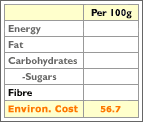Following on from my post the other day on the effect cows have on our environment I’ve been thinking more about food miles or, probably more accurately, food environmental cost.
Maybe we need, as consumers, some way of comparing apples with apples when making our purchasing decisions. Just as we need to be more aware of nutritional information with our expanding waistlines, we need to be more aware of the cost to the environment of our food.
Without much educated knowledge on the subject, I believe there are two key components. The cost of actually creating and producing the food in terms of emissions AND the cost of transporting the food to the consumer.
Logic would state that local food is good for the environment because it requires less transport to reach you (which is bad for the environment). But it’s not as simple as that which is why an index or exact figure amount on packaging (like calories or fat) would be so important.
There has been some press lately in the UK about the logic and cost in importing food items like kiwifruit from countries on the other side of the world, such as NZ with the term food miles bandied about a lot.
Our trade and industry groups were quick to point to reports such as Lincoln University’s own Comparing Energy/Emmision Performance [PDF 343KB] which refuted a lot of those claims. It reasons that, taking into consideration the amount of energy needed to produce and ship the food, it was more efficient for NZ to produce items like sheepmeat and apples and then ship them to the UK than it was for the UK to produce them itself. In the case of sheepmeat, we are 4 times more efficient.
Imagine another scenario as a UK consumer who wanted to be environmentally conscious deciding to buy locally grown tomatoes rather than cheaper imported Spanish tomatoes. However, in winter, the more environmentally friendly option would be to buy the Spanish tomatoes as they have a lower cost to the environment than local greenhouse-grown tomatoes.
 If we had, as consumers, a way of quickly making a comparison and decision based off a number figure or index we’d be a lot closer to becoming more responsible consumers. How it would exactly work is another seperate problem and as always any system is able to be abused and misused. But would it be insane to imagine it working something like this?
If we had, as consumers, a way of quickly making a comparison and decision based off a number figure or index we’d be a lot closer to becoming more responsible consumers. How it would exactly work is another seperate problem and as always any system is able to be abused and misused. But would it be insane to imagine it working something like this?